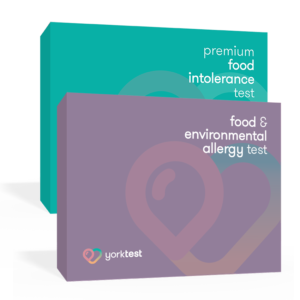Harrison

“This was as close to our ‘magic bullet’ as anything I’ve found”
- At the time, Sarah Veldkamp’s 5-year-old son, Harrison, had been suffering from behavioural issues and tiredness. He was also behind in his speech and language development
- Harrison was on the verge of being diagnosed with Autism
- His teacher noticed a change in Harrison’s behaviour after introducing cow’s milk into his diet, which led to Sarah researching into food intolerances to see if there was a link between the two
- Harrison’s food intolerance* test revealed that he was intolerant to cow’s milk, yeast and eggs
- After guidance from one of our nutritional therapists which is provided as part of the Junior Food Intolerance Test, Sarah started to notice a change in her son’s symptoms
- Sarah says the benefits of a YorkTest programme “lifted the haze and eased the struggle”
- Harrison is now receiving good reports from his teachers and has made “learning and paying attention a lot easier for him”
At the time, Sarah Veldkamp’s 5-year-old son, Harrison, had been suffering  from behavioural issues and tiredness. He was also behind in his speech and language development.
from behavioural issues and tiredness. He was also behind in his speech and language development.
“[He] was on the verge of being diagnosed with autism. He would have a very short temper at times and wasn’t sleeping well,” Sarah recalls.
The 34-year-old from Wisconsin couldn’t pinpoint exactly when his symptoms started to appear, but she noticed “they got worse and more apparent the older he got”.
A mother’s instinct is to find out exactly what could be aggravating a child’s symptoms in order to get their little one back to optimum health as quickly as possible. Sarah visited her medical practitioner, “but they thought we were overreacting” and Harrison was also tested for allergies which all came back negative. She also tried supplement combinations but to no avail.
Sarah explains: “I had always believed that he may have a problem with milk (since he had some crankiness and constipation since he first stopped breastfeeding). I had been buying almond milk for months, just to be on the safe side. When my husband started doing the shopping, he was buying regular milk.
“A few weeks after, my son’s teacher said something to me along the lines of “I don’t know what has changed, but he seems like a completely different kid than he did at the beginning of the year.” The only thing I could think of that had changed was the milk. So, I looked into food sensitivities.”
Through Internet research, the 34-year-old restaurant owner came across YorkTest, a leader in food intolerance* testing and over 38 years’ experience in diagnostic testing.
YorkTest’s award-winning Junior Food Intolerance Test has been expertly developed for the little ones. This simple finger-prick blood test analyses a child’s IgG reactions to over 100 food and drink ingredients, including commonplace foods such as cow’s milk, egg, wheat and gluten.
To help remove any trigger ingredients safely from a child’s diet, we provide two 30-minute calls with a qualified nutritional therapist and a results guidebook for extra guidance.
The process, which involves sending a finger-prick blood sample to the company’s in-house laboratory, revealed that Harrison was intolerant to just three foods: cow’s milk, yeast and eggs.
“Taking the test confirmed my suspicion about the milk, but it also revealed egg and yeast problems. I was not particularly surprised by the results, but it was very helpful to have more information in order to try to fix the problems,” Sarah explains.
With support from one of our nutritional therapists, which is provided as part of the Junior Food Intolerance* Test, Sarah began to make changes to Harrisons diet, but admits she found the process difficult at times.
“The things he was sensitive to are very, very common. However, the support you get from the phone call for nutritional support is very helpful,” Sarah says.
 It didn’t take long to see improvements in Harrison’s behaviour. “Seriously, the first day we removed the milk was the first day he had a good report from his teacher at school in months.
It didn’t take long to see improvements in Harrison’s behaviour. “Seriously, the first day we removed the milk was the first day he had a good report from his teacher at school in months.
“He immediately stopped acting up at school and started talking a lot more. I think it has impacted his ability to learn and pay attention quite a bit. So, he’s doing a lot more and a lot better than he would be had we not figured out the problems,” Sarah explains.
Two years since taking a Junior Food Intolerance* Test, Harrison still remains largely free from his trigger foods, but he sometimes has them in his diet on the odd occasion.
“If we stop paying close attention to what he eats he gets a little more emotional. We also do our best to make sure to give him digestive enzymes anytime he eats anything with dairy in it and I believe that helps”.
Reflecting on Harrison’s experience with YorkTest, Sarah says: “this was as close to our “magic bullet” as anything I’ve found”.
“This is the only thing I’ve ever tried that showed an immediate and obvious correlation between his behaviour/speech and something tangible that we could control. As I said, I believe eliminating these foods has cleared his mind and made learning and paying attention a lot easier for him. I think that’s a hugely important change for a child.
“It’s a great feeling to watch him look, act, and feel “normal.” It just lifted the haze and eased the struggle, making everything easier,” Sarah summarises.
Related Case Studies

Helen Dudson
- IBS / Digestive Problems
- Skin Conditions

Gareth Hunt
- IBS / Digestive Problems
- Tiredness / Fatigue

Cara Smith
““Very helpful, lovely and friendly””
- Tiredness / Fatigue

Claire Newrick
“Simply 'Amazing' ”
- IBS / Digestive Problems
- Tiredness / Fatigue




